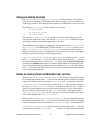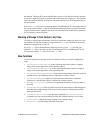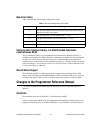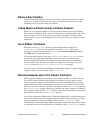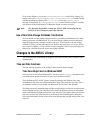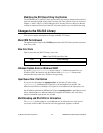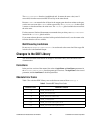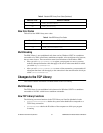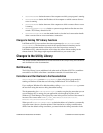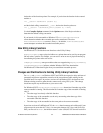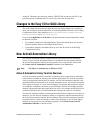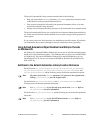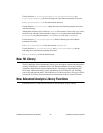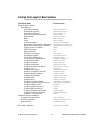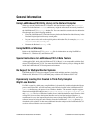
LabWindows/CVI Release Notes for Windows 32
©
National Instruments Corporation
• GetTCPHostName obtains the name of the computer on which your program is running.
•
GetTCPPeerAddr obtains the IP address of the computer on which a remote client or
server is running.
•
GetTCPPeerName obtains the name of the computer on which a remote client or server
is running.
•
GetTCPSystemErrorString obtains a system message that describes the error that
caused a TCP Library function to fail.
•
SetTCPDisconnectMode sets the method used to close the local conversation handle
when a remote client or server terminates a connection.
Changes to Existing TCP Library Functions
LabWindows/CVI 5.0 now enforces the timeout parameter for ServerTCPRead and
ClientTCPRead. The functions now wait for the specified interval when they receive
less than the maximum number of data bytes to be read. In previous versions of
LabWindows/CVI, when the functions receive data, they return without waiting for the
timeout interval. This change might require modifications to your source code.
Changes to the Utility Library
This section contains information on two new functions in the Utility Library and corrections
and clarifications to the documentation.
Multithreading
The Utility Library is now multithread safe when used on Windows 95/NT in a standalone
executable or in a DLL called from a standalone executable. No restrictions exist.
Corrections and Clarifications to the Documentation
GetCurrentPlatform returns kPlatformWin16 when called from a program that is
running on Windows 95 but that was built using LabWindows/CVI for Windows 3.1.
If you configure Windows 95 to hide the taskbar, calling
DisableTaskSwitching prevents
the user from using the mouse to bring the taskbar back up.
The documentation for
DisableTaskSwitching contains a registry key name that you can
use on Windows NT to arrange for your application to be brought up in place of the
Windows NT Task Manager. The registry key name in the previous version of the manual is
incorrect. The correct name is
HKEY_LOCAL_MACHINE\Software\Microsoft\
Windows NT\CurrentVersion\Winlogon
.
When you call
GetExternalModuleAddr to obtain the address of a function, you normally
assign the return value to a function pointer. If the function has a calling convention that
differs from the default calling convention, you must include the calling convention in the



